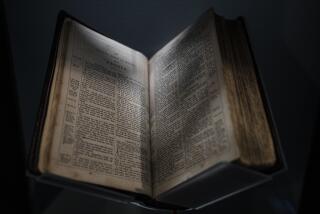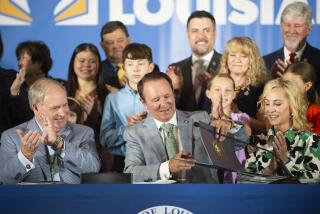Church Meets State in Supreme Court Ruling
- Share via
Re “Justices Allow Church Club to Meet in School,” June 12: I find it ironic that when the extremists in Iran took over and instituted changes that married religion and government in what seemed like the beginning of a modern-day crusade, I was proud of one of the most important tenets of America’s experiment in democracy--the separation of church and state. Now, two decades later, a progressive gets reelected in Iran who is bent on moving that country in a more secular direction, while America seems to be following the lead of the Islamic fundamentalists in, at the very least, blurring the line between government and religion.
At least Justice David Souter didn’t miss the point of what this ruling seems to stand for. His words were that it appears to stand “for the remarkable proposition that any public school opened for civil meetings must be opened for use as a church, synagogue or mosque.” I will be trying to educate myself better by finding out what other democracies around the world have done with this issue while they tried to follow the American model of government. Maybe some of them are doing a better job of staying true to the concept than we are.
David G. Monroe
Los Angeles
*
The decision of Supreme Court justices to allow church clubs to meet in schools creates an impossible situation. Religion is based on unsubstantiated proclamations of a supposedly supreme power. Public education is based on the scientific-method approach to reality. There is obviously a conflict between the religious and the scientific concepts of reality.
By allowing religious groups to practice their religion in a school setting we make the religious concept of reality equal to the scientific concept. Unless we want to return to the Dark Ages, we must choose science over mythology. Souter is right. Keep organized religion out of the public schools.
Quentin C. Stodola
Redondo Beach
*
No one should be surprised at the Supreme Court ruling allowing Christian groups to meet in public schools. As shown in a recent Library of Congress exhibit, our founding fathers held religious services in the Capitol and other government buildings. They were attended by Thomas Jefferson, who coined the phrase “a wall of separation between church and state” in a letter assuring Baptists that the Constitution was designed to protect religion. Jefferson also endorsed use in his hometown of a courthouse for religious services.
David S. Wilson
Los Angeles
More to Read
Get the L.A. Times Politics newsletter
Deeply reported insights into legislation, politics and policy from Sacramento, Washington and beyond. In your inbox three times per week.
You may occasionally receive promotional content from the Los Angeles Times.










